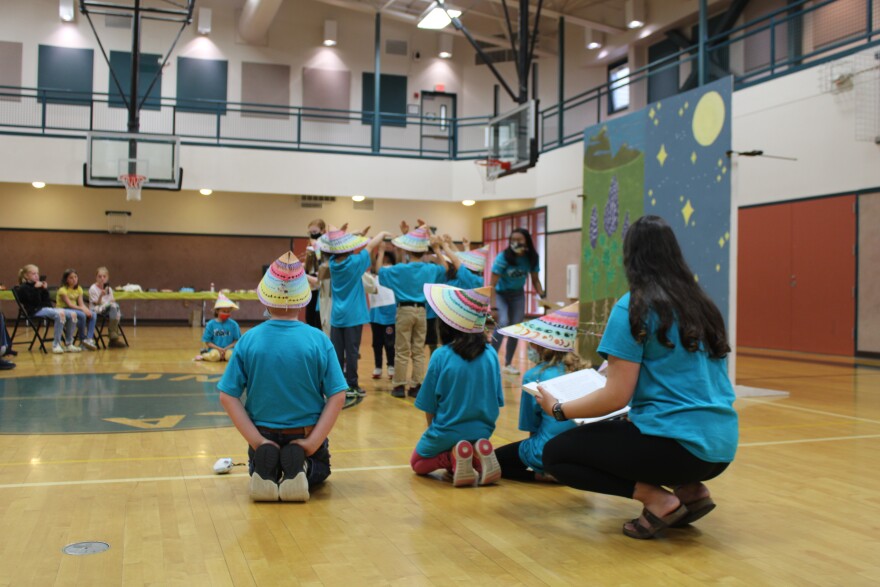Fletcher Bagley, a soon-to-be second grader, held a small glass vial in the air filled with a dark green liquid. It's wormwood oil, which can be used to cure dogs who are sick with worms, he explained. Then he grabbed another small jar with an illegible but colorful label.
"We're going to turn it into angelica salve," Bagley said, holding the jar in the air. "And I think that we get to eat it."
Bagley's right about almost everything he says — he did fill the small jar with a salve made from the local plant angelica. And wormwood is an herbal remedy for dogs with worms, though he didn't eat any of those items.
But by the end of his time at Camp Adgayux̂, Bagley and about 15 kids will be whizzes at making salves from local plants, while they learn about Unangax̂ values, language and art.
Camp Adgayux̂, also known as Camp A, resumed in 2021 at Unalaska's Community Center after it was cancelled last year due to coronavirus concerns.

The kids learn about local flora — what they can use for medicine and what is dangerous to eat or touch. They learn to harvest local plants and use them as medicine for things like burns from pushki — known in other parts of Alaska as cow parsnip — or as soothing lip balms. They also make paper versions of Unangax̂ bentwood hats, or chagudax̂, and learn about the values and language of the local Unangax̂ who've lived on the island for thousands of years.
Sharon Svarny-Livingston helped start the class about 10 years ago with longtime Unalaska resident Harriet Berikoff.
The camp culminates in a play at the end of the week. This year, Svarny-Livingston said the kids acted out a story about the moon's sister, who descends to the villages on the earth and has a son.
"She takes [her son] on a journey, and she takes him through the constellations — just as they are today. We have different names for them, of course," Svarny-Livingston said. "And eventually, they get to the moon's house, and [the moon's sister] dies on the trip because she got very old. And of course, the moon was getting old too, and so his nephew took his place."

Svarny-Livingston said this year was also unique because she had the help of local teen Rylee Lekanoff, who attended the camp when she was in elementary school.
"She stepped up quite a bit because I needed an Unangan helper who wasn't just a volunteer," Svarny-Livingston said. "I needed her to be able to take on certain aspects of the project and run with them."
Lekanoff led the Unangam Tunuu language and Unangax̂ values sections.
"Ugigdada — that one means 'share,'" Lekanoff said. "Tutada, is 'listen.' Chxadalgaax̂txin is 'don't steal,' and txin ugutada is 'be happy.'
Svarny-Livingston said she's excited to see Lekanoff returning to the camp as a mentor.

"That's the whole purpose, you know, of trying to preserve culture and save culture, is making sure that you always pass on your knowledge to somebody else, so that they can continue to pass it on," she said.
For the young ones, Svarny-Livingston said part of that preservation work involves breaking down some of the larger and more challenging concepts, values or practices, even in the artwork.
"They're looking at the design posters and they're going, 'we can't do that stuff,'" she said. "And I go, 'you've just got to break them down into little pieces. Break it down — you know, it's a line, it's a circle, it's a dot and it's repetitive and it just goes on and on.'"
As the kids work on their paper bentwood hats, a few chant Svarny-Livingston's mantra, "circle, line, dot, circle, line dot."






